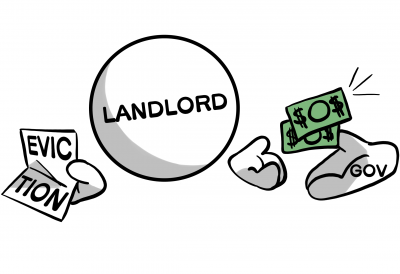Massachusetts’ eviction moratorium is scheduled to expire on Saturday, and Gov. Charlie Baker is hiring 15 retired judges to work on the 40,000 eviction cases postponed during the pandemic.
A ban on evictions was a short-term solution for a long-term problem. The moratorium is unsustainable and puts landlords under strenuous and unfair pressure while they simultaneously pay property taxes and lose out on profit.
The moratorium must end, but with our current lack of federal aid, state and local governments are now forced to handle the brunt of financial assistance for their constituents.

Lifting the ban on evictions and forcing people out of their homes before offering another federal stimulus check is cruel. However, there is no guarantee of any additional financial aid before the end of this year.
In any other country comparable to the United States, such a delayed response in federal action would be deemed unacceptable. Alas, our partisan politics have sparked another stubborn battle between elected leaders. The states and general public are now left to settle the disorder.
A lack of federal response has left states in a deadlock. States remain uncertain of budget proposals for the upcoming year because they don’t know what to expect from federal aid packages. Any help they have received, namely from the Coronavirus Aid, Relief, and Economic Security Act, has primarily been provided only for matters concerning COVID-19, which has caused severe budgetary deficits.
Congress passed the CARES Act in March, and it only helped to an extent. States are still left with the responsibility of readjusting their budgets to address those affected by COVID-19 while also attempting to make a financial recovery. Not to mention all of the red tape and bureaucratic measures they have to maneuver to adjust it successfully.
So as it seems, the government as a whole was grossly unprepared for this situation, and budget shortfalls have left everyone in a mess.
Even though states are in such a bind, they aren’t completely free of blame. Especially in Massachusetts, Baker could reassess his current handling of this situation.
He is directing funding toward the high salaries of 15 judges who will return to court and work on the thousands of eviction cases for up to 24 weeks.
It might sound unfair to ask them to sacrifice that payment, but the money could be allocated to resources that will help the many tenants who are about to be evicted by those very cases. Many people in the retired community would likely be willing to volunteer their time regardless.
Baker has rolled out several packages of aid programs this year for those facing housing insecurity, but people are still with dire financial problems.
We must look at other aspects of the state and local budgets as well. The police budget in Boston alone is $414 million, and recently took a budget cut of only three percent.
However, Boston does have a city-wide resiliency fund, among other initiatives, to help those who need housing payment relief. The City has worked with various local affordable housing nonprofits to confront the looming threat of evictions.
Though state and local governments don’t have total jurisdiction over financial decisions, they must still prioritize funding for relief aid programs over funding for anything else right now. We have not completely exhausted our options, and we can start by reallocating funds from departments already saturated with money.
Households facing eviction across the Commonwealth must see more effort from local leaders to ensure they are not simply thrown on the street, suddenly homeless in the wake of a pandemic.
Stress induced by money cannot make us lose sight of our humanity.















































































































